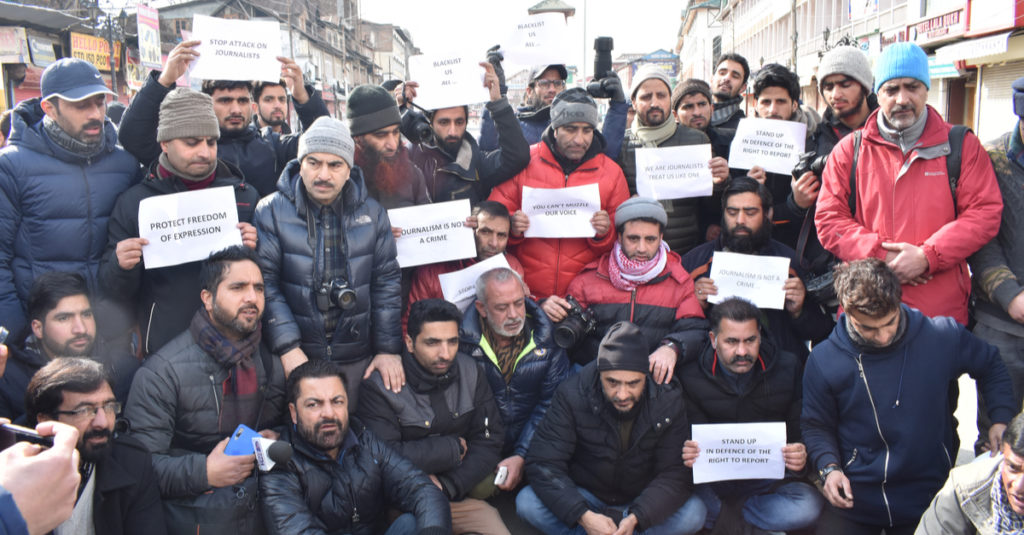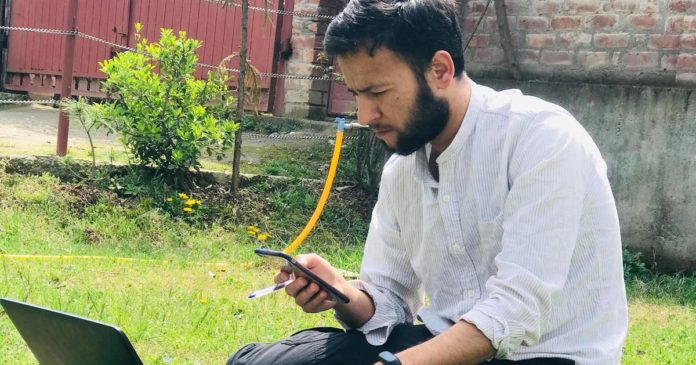The intimidation of journalists and suppression of media continues unabated in Indian-occupied Jammu and Kashmir (IOJK) with the arrest of a 26-year-old journalist Sajad Ahmad Dar, alias Sajad Gul.
Gul, a trainee reporter with a local web portal The Kashmir Walla, was arrested under the Public Safety Act (PSA) – a law that allows the detention of anyone for a period of up to two years without a trial – and is currently incarcerated in Kot Bhalwal jail in Jammu.
He was first arrested on January 7th by the Indian army and was later handed over to the Jammu and Kashmir Police in Sumbal, a town around 20kms north of Srinagar. Gul was granted bail but was again arrested and booked for two years.
Umair Ronga, the counsel for Gul, told The Kashmir Walla: “When the orders of release reached the police station, the family members were made to wait for a few hours, to be informed that the journalist would not be released on the pretext that one more FIR (First Information Report) has been registered against him, apparently to thwart the orders of court.”
J&K Police said in a statement: “Sajad Gul uploaded objectionable videos with anti-national slogans raised by some women folk on the day when most wanted terrorist Saleem Parray was eliminated in Shalimar Srinagar. The said person under the garb of a journalist is habitual of spreading disinformation/false narratives through different social media platforms in order to create ill will against the government by provoking general masses to resort to violence and disturb public peace and tranquillity…
“Moreover, his overall activities are prejudicial to the sovereignty, integrity and unity of India. Accordingly, a case has been registered against him in which he has been arrested and presently is on Police remand.”
Local as well as international press rights groups, including the Committee to Protect Journalists (CPJ), have condemned Gul’s detention and urged Indian authorities to drop charges against him.
Subscribe to our newsletter and stay updated on the latest news and updates from around the Muslim world!
CPJ said in a statement: “Authorities must immediately release Gul and drop their investigations related to his journalistic work. Amid ongoing police harassment in retaliation for his journalistic work, CPJ reiterates its call on authorities to drop their investigation into Gul and allow him to report without interference.”
The Journalist Federation of Kashmir (JFK) said: “JFK condemns the PSA against journalist Sajad Gul. JFK is shocked at the brazen and extreme action against Gul and see it as an act of punitive retribution for his journalistic work on the ground that the authorities are uncomfortable with. The detention under PSA violates Gul’s right to liberty and freedom of expression as a journalist and also contravenes the court order that granted him bail…

“We strongly condemn the latest action and view it as continued attacks on freedom of the press in #Kashmir. Journalists in Kashmir have always worked under perilous conditions, holding up values of press freedom in the face of dangers to life and liberty. JFK reiterates the demand that the practice of summoning journalists to police stations should end and demand that Gul should be released immediately.”
The All Parties Hurriyat Conference, an amalgamation of resistance parties in IOJK, condemned the actions against Gul. A statement read: “A few days back journalist Sajad Gul was arrested for doing his duty of reporting facts, and charged brutally for criminal conspiracy, such harassment of scribes has become a routine in the valley.” APHC asked the authorities to immediately release Sajad Gul and put an end to the policy of intimidation through arrests and detentions.
Journalists in IOJK have faced repeated threats and harassment by different government agencies after India scrapped limited autonomy that was guaranteed under Article 370 of the Indian constitution.
Journalists have been arrested, harassed, beaten, threatened with consequences for reporting, investigated and booked under anti-terrorism laws.
In September last year, four senior journalists including Showkat Motta, Hilal Mir, Shah Abbas and Azhar Qadri’s houses were raided and their electronic gadgets and some books were seized. They were later detained at a police station in Srinagar and were booked under the Unlawful Activities (Prevention) Act case filed in 2020.
Since 2019, three other journalists from Kashmir, Masrat Zehra, Gowhar Geelani and Peerzada Ashiq were booked under the anti-terror law.
Multiple journalists, without divulging details and on the condition of strict anonymity, told 5Pillars that they faced questioning and are constantly being called to police stations for one reason or the other.
An elected body of journalists in IOJK, The Kashmir Press Club (KPC), has on multiple occasions urged the government to allow the journalists in the region to report freely.
The KPC itself was overrun by members of the region’s paramilitary forces on January 15th this year. They claimed that they were enforcing Covid-19 measures. It was disbanded its doors were then sealed and journalists are denied entry since then.
Daniel Bastard, the head of Reporters Without Borders Asia-Pacific desk, said: “We call on Jammu and Kashmir Lieutenant Governor Manoj Sinha to immediately restore the KPC’s licence and order its reopening. This society’s closure is clearly the outcome of a coup hatched at great length by the local government, which follows Prime Minister Narendra Modi’s orders. This undeclared coup is an Indian government insult to all the journalists trying to do their job in the Kashmir Valley, which is steadily being transformed into a black hole for news and information.”
Follow 5Pillars on Telegram here
Subscribe to our Newsletter here


















